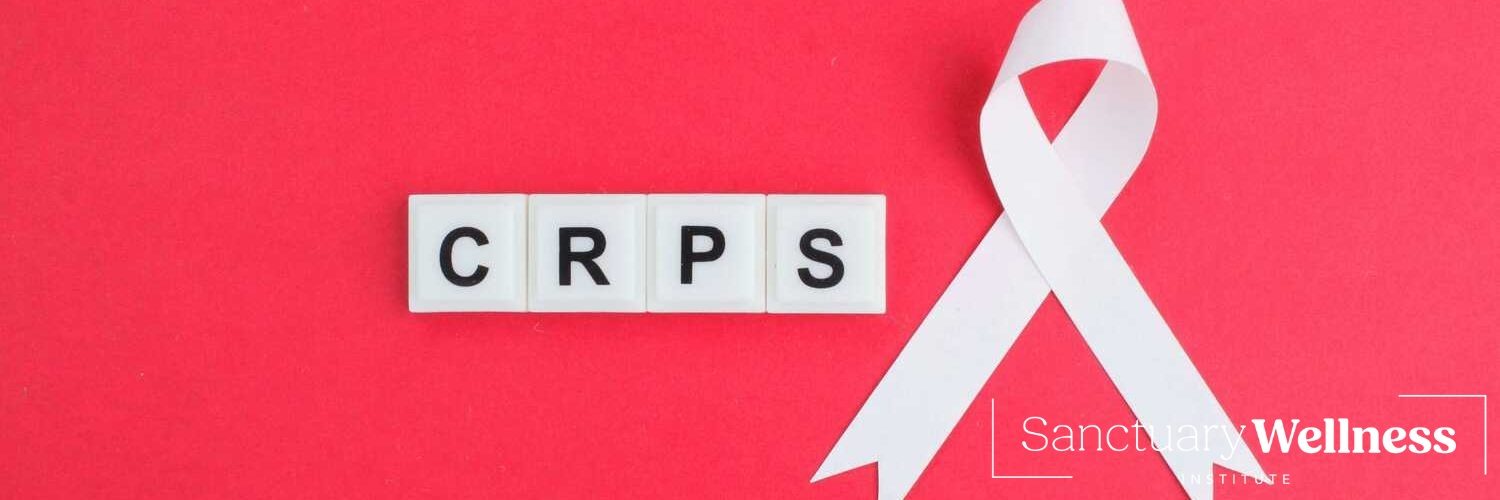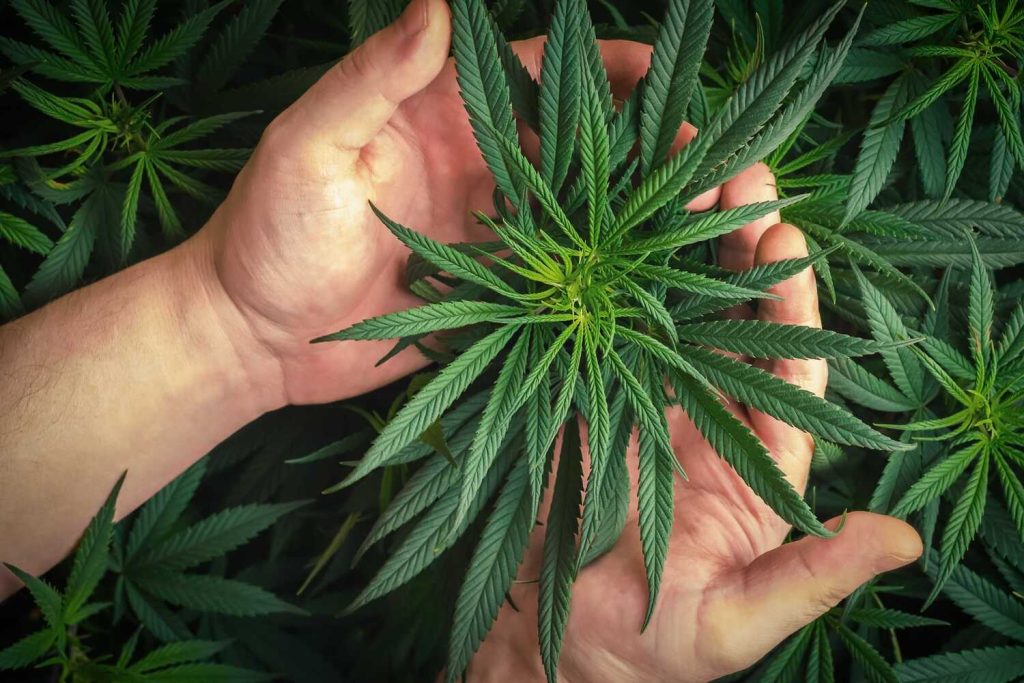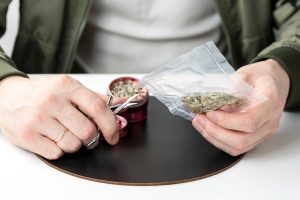Marijuana for CRPS (Causalgia)
- Nicholas DiBella
- Published: October 12, 2024
- Updated: October 12, 2024
- Fact-checked by Dr. Desiree Granados

Complex Regional Pain Syndrome (CRPS) Type II, also known as “causalgia,” is a chronic pain condition that typically develops after an injury to a peripheral nerve. Characterized by intense, burning pain that can spread beyond the site of the original injury, CRPS can significantly impact an individual’s quality of life.
As traditional pain management methods may fall short for some patients, medical marijuana has emerged as a potential treatment to help alleviate symptoms and improve daily functioning.
Does Marijuana Help With CRPS?
Yes, medical marijuana has been shown to potentially help people manage the symptoms of causalgia (CRPS). Cannabis may offer relief by interacting with the body’s endocannabinoid system, which plays a role in regulating pain and inflammation. The cannabinoids found in marijuana, particularly THC and CBD, have anti-inflammatory and analgesic properties, which may help reduce the chronic pain associated with CRPS.
Research into cannabis for nerve-related pain suggests that it may help decrease pain intensity and improve sleep quality in individuals suffering from chronic pain conditions. Although direct studies on marijuana’s effects on causalgia are limited, cannabis is frequently used to treat other neuropathic pain conditions, making it a promising option for those seeking relief from the intense discomfort of CRPS.

What Is CRPS and What Are Its Symptoms?
Causalgia, or CRPS Type II, is a chronic pain condition that typically arises after damage to a peripheral nerve, often following surgery or trauma. Unlike other forms of chronic pain, CRPS is characterized by burning, stabbing pain that can be disproportionate to the initial injury. The pain can radiate from the site of the injury to other parts of the body and can be triggered by something as simple as a light touch or change in temperature.
Some common symptoms of CRPS include:
- Intense, burning pain
- Swelling and inflammation
- Changes in skin temperature or color
- Sensitivity to touch
- Muscle spasms or weakness
- Difficulty moving the affected limb
Because the condition is progressive, it can worsen over time if not properly treated. Conventional treatments for CRPS include pain medications, physical therapy, and nerve blocks. However, these options may not always provide sufficient relief, leading many patients to explore alternative therapies like medical marijuana.
Can You Get a Medical Marijuana Card for CRPS (Causalgia)?
Currently, Illinois and Connecticut list “Complex Regional Pain” as a qualifying condition for a medical marijuana card, while only Illinois specifically lists “causalgia.” However, about half of U.S. medical marijuana states recognize “chronic pain” as a qualifying condition for medical marijuana use, which often applies to individuals with CRPS. Additionally, several states like Arkansas and Missouri recognize “muscle spasms” as a qualifying condition. You can learn more about medical marijuana laws in your state by visiting our interactive map resource: Medical Marijuana Laws by State
The Sanctuary Wellness Institute operates in multiple states where patients can obtain medical marijuana cards. It is essential to check the specific laws in your state to determine if CRPS or other chronic pain conditions qualify for medical marijuana use, as the approval process varies by state.
If you’re considering medical marijuana to treat causalgia/CRPS, you can start by consulting with a medical marijuana doctor to discuss your symptoms and treatment options. Once approved, you can apply for a medical marijuana card in your state, granting you access to cannabis products that may help alleviate your symptoms.
How to Use Marijuana for CRPS
When using medical marijuana to treat CRPS, there are several consumption methods available, allowing patients to choose what works best for them. Some common methods include:
- Smoking or Vaping: Inhalation provides fast relief, making it suitable for managing acute pain flare-ups. Smoking or vaping allows cannabinoids to enter the bloodstream quickly, offering rapid effects.
- Edibles: Cannabis-infused edibles, such as gummies or baked goods, provide longer-lasting relief. However, their effects take longer to kick in, making them better suited for sustained pain management.
- Tinctures and Oils: Placing cannabis tinctures or oils under the tongue allows for faster absorption than edibles and offers more control over dosage.
- Topicals: Creams or balms infused with cannabis can be applied directly to the skin, helping to target localized pain or inflammation in the affected area.
The method of consumption you choose will depend on your preferences, lifestyle, and the severity of your symptoms. It’s recommended to work with a medical marijuana doctor to determine the best approach for using cannabis for your specific case of CRPS.
What Are the Best Marijuana Strains for CRPS?
Selecting the right marijuana strain to manage CRPS can make a significant difference in how effectively it alleviates your symptoms. Some strains are known for their strong pain-relieving properties and ability to reduce inflammation. Below are a few strains that may help individuals suffering from causalgia:
- Harlequin: A CBD-heavy strain known for its ability to manage pain and reduce inflammation without significant psychoactive effects.
- ACDC: Another CBD-rich strain that offers pain relief while minimizing the high associated with THC-dominant strains.
- OG Kush: A powerful strain known for its ability to relieve chronic pain and improve sleep, making it an excellent choice for nighttime use.
- Blue Dream: A hybrid strain that combines relaxation with pain relief, helping to reduce discomfort while maintaining mental clarity.
Conclusion
Medical marijuana has the potential to help individuals manage the intense pain and inflammation associated with causalgia/CRPS, providing an alternative to traditional pain management methods. By interacting with the body’s pain-regulating systems, cannabis may help reduce the severity of symptoms and improve quality of life.
If you’re interested in exploring medical marijuana as a treatment for causalgia/CRPS, the Sanctuary Wellness Institute can help you navigate the process of obtaining a medical marijuana card.
States Where We Offer Medical Marijuana Card Services
How we reviewed this article:
- Seegehalli M. Anil, Hadar Peeri, and Hinanit Koltai (2022). Medical Cannabis Activity Against Inflammation: Active Compounds and Modes of Action
https://www.ncbi.nlm.nih.gov/pmc/articles/PMC9124761/ - Vania Modesto-Lowe, Rachel Bojka, and Camille Alvarado (2018). Cannabis for peripheral neuropathy: The good, the bad, and the unknown
https://www.ccjm.org/content/85/12/943 - UCLA Health (2024). Causalgia
https://www.uclahealth.org/medical-services/neurosurgery/conditions-treated/causalgia - Donna Christiano (2024). Complex Regional Pain Syndrome Type II (Causalgia)
https://www.healthline.com/health/causalgia - Leafly (2024). ACDC
https://www.leafly.com/strains/acdc - Leafly (2024). OG Kush
https://www.leafly.com/strains/og-kush
Current Version
October 12, 2024
Written By
Nicholas DiBella
Fact-checked By
Dr. Desiree Granados
Editorial Process
Our Editorial Process
Other Posts About Medical Marijuana Treatment

Nicholas DiBella received his psychology degree from West Chester University of Pennsylvania and has been writing content for the Sanctuary Wellness Institute since 2023. He is passionate about all things health & wellness.







